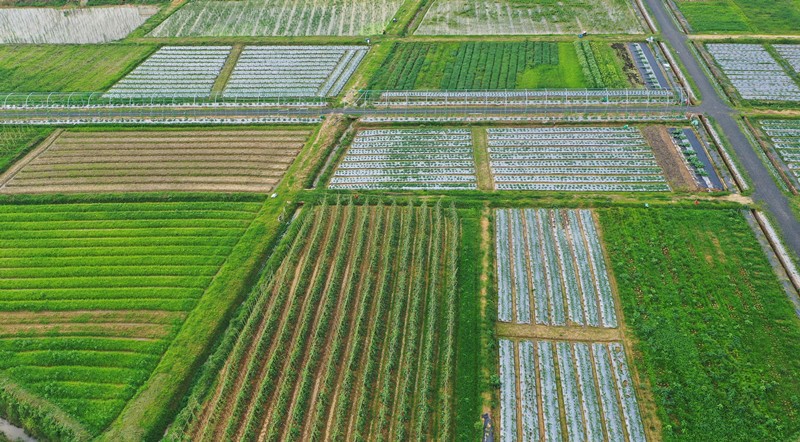New-type markets send food from the field to the cooking pot directly (3)
 |
| Photo taken on May 25, 2021, shows a vegetable planting base in Taihe county, Ji’an city, east China’s Jiangxi province. (People’s Daily Online/Deng Heping) |
Provincial supply and marketing cooperative systems in China have built new-type vegetable stores and markets and transformed old ones to offer residents pollution-free agricultural and sideline products at prices lower than market prices.
In the first half of last year, the system of the supply and marketing cooperatives of northeast China’s Jilin province launched a project to benefit both farmers and consumers by establishing convenience vegetable distribution stores in residential communities.
These stores provide residents with a rich variety of pollution-free agricultural and sideline products, including vegetables, fruits, grain, and cooking oil. Relevant information about all these products can be found in a complete quality traceability system. And the prices of the goods in such stores are generally 10 percent to 20 percent lower than their market prices.
These stores have included agricultural and sideline products of every village in large-scale cultivation according to orders, thus expanding market for featured products of villages while significantly reducing cost of agricultural means of production, said Liu Shuangliang, a leader in the project.
Adopting a model featuring online procurement services, offline fair, and targeted services, these stores bring agricultural and sideline products directly from farmers’ professional cooperatives and production and processing enterprises to unoccupied places in communities, and then to people’s homes via the logistics network of Chinese delivery services giant SF Express, cutting out the intermediate steps in the whole supply and marketing process.
So far, a total of 51 such convenience agricultural and sideline product stores have been established in residential communities in Jilin province, the number of similar supermarkets and convenience stores has reached 208, and that of self-service sites under the project has exceeded 100,000.
Covering all townships in Jilin province and linking various distribution channels with 269 farmers’ professional cooperatives, the project has effectively increased farmers’ income and provided high-quality agricultural and sideline products at reasonable prices for residents.
In addition to accelerating the integration of online and offline channels and encouraging connection with residential communities, vegetable markets of the supply and marketing system are undergoing upgrading and transformation and seeing more and more smart facilities.
“There have been more customers since the environment was improved,” said Fan Yanlin, owner of a seasoning wholesale store at a vegetable market in Jianghan District, Wuhan, capital of central China’s Hubei province.
Vegetables, fruits, aquatic products, and meat are neatly arranged under categories in the clean vegetable market, which is equipped with 5G intelligent surveillance cameras, temperature sensors, a large screen for information about food prices, as well as devices for mobile payment.
The ndoor temperature of the vegetable market is maintained at 26 degrees Celsius, and three full-time cleaners have been hired to keep the place clean and tidy. The environment in the market is now as pleasant as that of a shopping mall.
Built in the 1990s, the vegetable market had neither air conditioner, security guard nor cleaning staff.
The great changes to the market are attributed to a company affiliated with the Hubei Provincial Supply and Marketing Cooperatives, which upgraded and transformed the old vegetable market and improved its management system and eventually its popularity.
Based on its cooperation with the agricultural product bases of supply and marketing cooperatives, the market has realized direct supply of vegetables and quality control over relevant goods. Besides, it displays results of pesticide residue detection of stalls provided by market regulatory authority on the large electronic screen every day.
According to Liu Zhe, deputy general manager of the company that transformed the vegetable market, the company runs 32 fresh food farmers’ markets in Wuhan. Covering more than 300 residential communities in the city, these markets are open all year round and witness an average daily sales volume of over 10 million yuan ($1.55 million).
The company will cooperate with online shopping platforms that offer instant delivery services to give a greater boost to the transformation and upgrading of old vegetable markets and promote the innovation and upgrading of supply and marketing services, Liu disclosed.
In recent years, China’s supply and marketing system has intensified efforts to promote the circulation of agricultural products, strengthened the construction of markets for these products, and accelerated the development of e-commerce services and logistics systems at the county, township, and village levels, making a market network linking planting bases with final consumers begin to take shape, said Han Liping, secretary of the leading Party members group of the All China Federation of Supply and Marketing Cooperatives (ACFSMC) and deputy director of the council of the ACFSMC.
Last year, the country’s supply and marketing system saw the sales volume of agricultural products reach 2.2 trillion yuan, marking a 19.5-percent increase year on year, according to Han.
In the future, efforts will be made to speed up the construction of a cold chain logistics backbone network for agricultural products of supply and marketing cooperatives and accelerate the formation of a market system for agricultural products of supply and marketing cooperatives featuring reasonable layout, efficient and smooth operation, as well as organic connection between markets in producing areas, distributing areas, and sales areas, so as to improve the capacity of agricultural products supply and marketing cooperatives for sustainable development, Han said.
 |  |
Photos
Related Stories
Copyright © 2021 People's Daily Online. All Rights Reserved.










